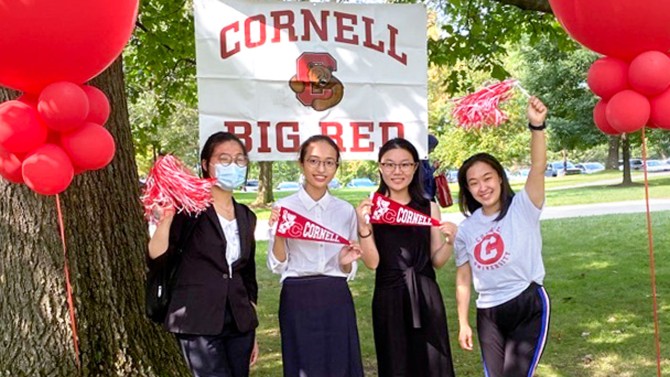Study Away helped Cornell students forge, keep connections
By Priya Pradhan
When the COVID-19 pandemic struck in 2020, Cornell’s international students were faced with a tough decision: Return home before borders closed and risk uncertainty about re-entering the U.S., or remain on campus far away from loved ones.
Some chose to stay, while others returned home to study remotely or enrolled in one of Cornell’s 10 Study Away locations.
A residential option created by Global Cornell for internationals who could not travel to campus, Study Away allowed students to live and study at a partner university in their home country or region. Whether they were first-years who met fellow students and Cornell alumni thousands of miles from Ithaca, or sophomores and juniors who maintained connections through virtual student organizations, participating students said Study Away helped them fight isolation and build a sense of belonging at Cornell.
Yet with the return of in-person classes, international students who were away for more than a year, or who started their Cornell journeys abroad, have experienced some challenges on campus during the 2021–22 academic year.
“Many students don’t feel integrated into the Cornell community now – especially sophomores and transfer students,” said Sergio Limandibratha ’22, a government and information science major who leads the International Students Union (ISU).
Staff members from Cornell Health, including Counseling and Psychological Services (CAPS), have seen international students struggle with mental health and isolation – both during their time away from campus early in the pandemic and upon their return to campus.
“The need to work or study remotely during the pandemic affected many international students at Cornell,” said Dr. Wai Kwong-Wong, assistant director for community-based services in CAPS. “Many of the budding friendship and support systems were disrupted.”
For Michelle Ren Zhang ’23, a hotel administration major, being the only undergraduate student from Chile and studying remotely meant feeling disconnected from her Cornell friends.
“So many of my friends from freshman year were still on campus, and they were hanging out,” Zhang said. “Being in another country, I didn't really know what’s happening because I wasn’t there in person.”
Others, like first-years who studied remotely or at Study Away, never got the chance to set down roots in Ithaca. Although sophomores now, they’ve felt as new to Cornell as this year’s entering students.
“International students want to make connections and embrace campus life just as much as domestic students,” said Brandon Lanners, executive director of the Office of Global Learning (OGL). “Working with campus partners and international student organizations has been key this year to helping new and returning international students navigate Cornell and find their fit.”
Class of ’22 send-off May 5
OGL offers orientations, including Prepare for entering international students, and other events and services to help international students connect with each other and acclimate. Class of 2022 graduates will get a send-off from OGL and Cornell’s international community at this year’s international graduation reception on May 5.
Angela Pan ’23 was a freshman when the pandemic struck, and she quickly packed up and headed home to Beijing. Now a junior majoring in government and the College of Arts and Science’s China and Asia-Pacific Studies Program, Pan spent the fall in Ithaca before heading to Cornell in Washington this spring.
“It was exciting to revisit my favorite places on campus and relive why I chose to come here in the first place,” Pan said. “I felt like I missed out on a lot by not being on campus.”
Cornell’s international students continued to face hard decisions this spring.
Efua Aidoo-Andoh ’24, an economics major from Ghana, decided against returning home for winter break due to the omicron variant. “I was worried that if I went back to Ghana, the U.S. might close its borders, so I just decided to stay in Ithaca,” Aidoo-Andoh said.
To provide internationals with additional support, CAPS has been offering an International Student Process Group this semester. Meetings take place over Zoom every Tuesday at 4 p.m. With rolling admissions, the group welcomes undergraduate, graduate and professional students to join at any time.
“Problems in a student’s home country – such as COVID, political tensions, economic hardships or conflict – can weigh heavily on students already coping with the many stresses of being an international student,” Kwong-Wong said. “Group support can be tremendously effective for students seeking community and a sense of belonging.”
Despite the unprecedented challenges that returning to Ithaca have brought, students have begun settling into campus life once again.
Zhang and Caroline Chen ’23, who studied away at Shanghai Jiao Tong University, had not seen each other since before the pandemic began. They say students have been enjoying the smallest moments: watching the sunset from Libe Slope, spontaneously bumping into friends, and meeting face-to-face instead of on Zoom.
Those new to Ithaca have felt welcomed by their professors and peers – and even strangers on campus. “My favorite experiences have been the people I have met,” Aidoo-Andoh said. “They are all really nice. And it’s made me feel at home.”
ISU and other student organizations have resumed in-person events with food to foster community.
“I think it’s just super refreshing to have these events in person again,” Limandibratha said. “Now I get to meet all the new international students, and the level of connection is much higher.”
Priya Pradhan ’22 is senior writing intern for Global Cornell.
Media Contact
Get Cornell news delivered right to your inbox.
Subscribe

